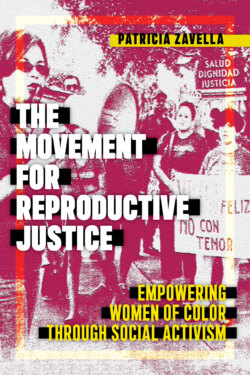Читать книгу The Movement for Reproductive Justice - Patricia Zavella - Страница 18
На сайте Литреса книга снята с продажи.
Voicing Our Power: Somos Chingonas
ОглавлениеCLRJ also engages in cultural shift work through its tag line, “somos chingonas,” which can be found in its social marketing. The phrase originated after a presentation about its work, when one of its board members, Mily Treviño-Sauceda (a well-known activist with women farmworkers), remarked, ‘¡Ustedes son chingonas!’ (y’all are badass women!), and it stuck. Chingona implicitly is sexually charged, since chingar literally means “to fuck,” with problematic connotations of having dominance over those with whom one has sex. In The Labyrinth of Solitude, the Nobel Prize winner Octavio Paz rationalized misogynist treatment by colonized Mexican men over women by suggesting that chingar was culturally sanctioned. He also coined the epithet Malinche, critiquing the translator between the Spanish colonizers and indigenous peoples as a betrayer; the term is still used against women today and rationalizes mistreatment of women.49
Through the use of “chingona,” CLRJ staff shift the frame from heteropatriarchal connotations, and “chingona” takes on three different meanings in the organization’s work. “Somos chingonas” signifies an internal assessment, as executive director Laura Jimenez stated: “It is part of culture shift for us and within our own movement.” On the one hand, women of color engage in a profound personal transformation as they come into reproductive justice organizing. Christina Lares, CLRJ’s community engagement manager, clarified:
When people get involved in movements, there’s a place where you have to come to within and really find your own place in this work. A lot of times we have to heal ourselves and really address some of the issues that we have. And I think “chingonas” is the starting point for a lot of folks, of creating that power and then taking back of our stories and experiences and realizing we can change our realities, and we’re not these stereotypes and these negative images that are portrayed in the media or are told to us by politicians. We’re diverse, we’re dynamic, we come from a history of struggle, and we have power. So, I think “chingonas” for a lot of folks, it jolts them, but that’s who we are as an organization. We have those conversations, and I think a lot of folks, once they start to talk and learn and hear and heal, they really like to embrace that.
The cultural shift that women experience is reinforced by the ways in which the reproductive justice movement continually assesses its efficacy and resonance with the participants.
The second meaning is organizational, according to Laura Jimenez: “For me that ideology, ‘somos chingonas,’ is saying, ‘We’re not compromising here.’” In the long process of negotiating positions on proposed legislation with different coalitions, for example, often CLRJ activists have to explain their stances by pointing out that they would not choose between immigrant rights and women’s rights since those categories overlap. This means they often have to educate, communicate, and negotiate with collaborators but also refuse to give up their core values. “Somos chingonas” articulates their intersectionality politics.
The third meaning of “somos chingonas” points to the hypervisibility and tokenism by women of color in institutional political venues. For example, in California, where fifteen million Latinxs made up 39 percent of the population in 2017,50 there were only ten Latina state legislators.51 For Myra Duran, formerly CLRJ’s policy manager, the dearth of familiar faces can be daunting:
For the longest time I was hard-pressed to find a lobbyist in Sacramento that was a woman and that was Latina. So, for me, “somos chingonas” is really about being unapologetic about who we are as Latinas, including how we look. Like for me, I’m all about disrupting professional attire in the capitol. I fucking hate that shit. So for me that brings up all that sentiment, especially for young Latinas that want to get into politics but they don’t see themselves reflected in these places. And for me it’s about being unapologetic and owning your voice, taking up space. We do badass work, but sometimes it’s not reflected in or appreciated by mainstream organizations or mainstream movements. So it’s trying to really flip the script on that.
In many ways, claiming “somos chingonas” also reflects a politics of integrity, in which the organization figures out its stance on an issue and is willing to accept the consequences for that, including being called obstructionist or other negative terms.
However, “chingonas” is a slang term that is more common in Mexican Spanish than in other countries in Latin America. Thus, “chingona” can reflect the dominance of Mexicans in California politics, with which some Latinxs do not relate. At a lobbying event, the group of five women I was with had a discussion of “somos chingonas,” and a Puerto Rican woman said she preferred to use “jodona” (Caribbean Spanish with a rough translation of “badass woman”). When I mentioned this to the CLRJ staff, Lares smiled in acknowledgment and pointed out, “They find their own ‘poderosa’ or ‘jodona,’ ‘peleonera [fighter],’ ‘ronca [bossy]’; whatever term they feel they can identify with, they can take that.”
Other organizations have their own forms of empowering language. Eveline Shen, executive director of Forward Together, for example, signs her email with “In Power.” COLOR calls its annual anniversary event that celebrates its founding madrinas (godmothers) “Viva la Diva.” It also concludes its events by circling together and giving a group cheer: “¡Aaaay chingona!” (We’re badass!). It also promotes COLORista discourse about young women’s empowerment. The Strong Families Network extends strengths-based culture shift work toward the cultural politics related to families.
